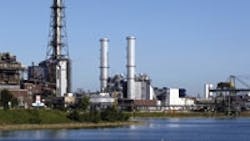BASF's Three Pillars of Energy Efficiency
The German word "verbund" means "linked or integrated to the maximum degree," according to chemicals manufacturer BASF Corp. For BASF, Verbund is a key component of an energy-efficiency strategy that integrates infrastructure, process, energy and waste management.
Verbund is part of the company's "three pillars" for increasing energy efficiency, which also includes combined cycle gas turbine power plants and energy-efficient processes, ARC Advisory Group reported after its February Manufacturing Strategies and Best Practices for Sustainable Manufacturing forum in Orlando.
BASF operates six Verbund sites, the largest of which is located in Ludwigshafen, Germany. At its Verbund sites, production plants, energy and waste flows, logistics and site infrastructure are all integrated. For instance, at Ludwigshafen a network of more than 200 production plants are connected by 1,242 miles of pipelines that receive raw materials and energy, creating a more efficient means of transportation.
BASF's new cogeneration power plant supplies production facilities at the company's Ludwigshafen, Germany, site with 400 megawatts of electricity and 650 metric tons of steam per hour.
The production complex in Ludwigshafen also utilizes variable-speed drives for pumps, which can provide a 20% to 30% energy-efficiency increase over fixed-speed pumps, Kersting noted. Additionally, the Ludwigshafen facilities are equipped with intelligent heat trace systems that prevent freezing by monitoring ambient temperatures. Heat trace systems can cut electrical consumption by as much as 80%, according to Kersting.
See Also
About the Author
Jonathan Katz
Former Managing Editor
Former Managing Editor Jon Katz covered leadership and strategy, tackling subjects such as lean manufacturing leadership, strategy development and deployment, corporate culture, corporate social responsibility, and growth strategies. As well, he provided news and analysis of successful companies in the chemical and energy industries, including oil and gas, renewable and alternative.
Jon worked as an intern for IndustryWeek before serving as a reporter for The Morning Journal and then as an associate editor for Penton Media’s Supply Chain Technology News.
Jon received his bachelor’s degree in Journalism from Kent State University and is a die-hard Cleveland sports fan.
